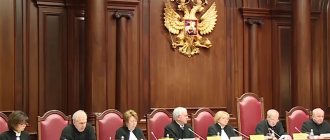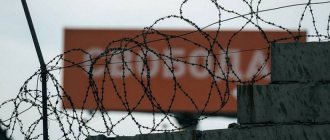Why Russia should more often confiscate property illegally acquired by government officials
The International Anti-Money Laundering Group recommended that Russia more actively use confiscation of property against government officials if the legality of their ownership is not confirmed, and also expand the list of seized assets
Photo: Stanislav Krasilnikov / TASS
Russia must expand the list of assets of deputies, senators, federal and regional officials, heads of state-owned companies and judges that can be confiscated as illegal wealth. This recommendation was made by the international Financial Action Task Force (FATF) following a comprehensive assessment of the Russian system for combating money laundering and the financing of terrorism (AML/CFT).
The FATF visiting mission in Moscow took place from March 11 to March 29, 2019 and was the fourth inspection, the previous one taking place ten years ago - in 2008. Experts from the intergovernmental organization established by the G7 assessed the level of Russia’s fight against money laundering. On October 18, the first results became known, and now the FATF has published an extended report.
Minor seizures
Russia is not a major laundering center, but mainly acts as a source of criminal proceeds, a significant part of which is laundered abroad, FATF experts note. The biggest sources of criminal income come from theft from the budget, tax evasion, corruption, fraud in the financial sector and drug trafficking.
- The damage from investigated cases of obtaining criminal proceeds reaches 220 billion rubles. annually for the period 2014–2018.
- 85% of detected money laundering crimes are related to drug trafficking and theft of budget funds.
- 30% of all criminal proceeds, or $1 billion, come from theft from the budget.
- In total, almost 318.5 billion rubles were seized from criminals. (fines not included) from 2014 to 2021 through the use of all mechanisms for confiscation, damages and satisfaction of civil claims; the share of seized assets in all criminal cases of money laundering was less than 1.5% of the total amount of seized assets.
The amounts of criminal confiscations are much more modest than the total amounts of compensation for damages, FATF notes. The amount of voluntary compensation for damage is 8.5 times higher than the amount of confiscations under the verdict - 75 billion versus 8.8 billion rubles. for 2021. This is because voluntary compensation may lead to leniency in sentencing.
Confiscation of property: grounds, signs and conditions for the procedure
In criminal and administrative legislation, confiscation of property acts as an additional penalty. In total, the Criminal Code of the Russian Federation provides for more than 70 grounds for punishment with confiscation of property, including: murder, human trafficking in narcotic drugs, terrorist activity and others. The main condition for such a measure as confiscation of property is the legality of the procedure, that is, it must clearly comply with all the norms and requirements of the current legislation. All property subject to confiscation becomes the property of government agencies and is subsequently put up for sale at public auction. However, there are exceptions here - cases where a number of certain obligations are imposed on a citizen who has committed a criminal act (compensate for moral or material damage, pay child support after a divorce or a loan). Confiscation, as an additional penalty, is applicable to both individuals and legal entities, and can represent complete, partial or special alienation of property. The main signs of confiscation are:
- lack of independence;
- compatible with any preventive measure;
- is not an alternative to punishment;
- is recognized as a preventive measure;
- contributes to the restoration of social relations.
How illegal wealth is confiscated in Russia
In December 2012, Russian President Vladimir Putin signed the law “On control over the compliance of expenses of persons holding government positions and other persons with their income,” which introduced a mechanism for confiscating the wealth of officials whose expenses exceed their official income. By law, law enforcement agencies must pay attention to a civil servant if he or his family spends more than the income declared over the last three years. The Prosecutor General's Office may require the official to justify his expenses. If an official cannot prove the legality of the origin of funds and property, he must be dismissed from service, and the wealth must be turned into state revenue.
In November, the Constitutional Court allowed the seizure of funds from distant relatives and acquaintances of corrupt officials. The issue was considered in connection with the case of former police colonel Dmitry Zakharchenko.
Seized funds and proceeds from the sale of assets are transferred to the federal budget. The Ministry of Finance receives cash and funds from the sale of confiscated property and luxury goods, and Gokhran receives precious metals and stones, jewelry and bullion.
However, unjustified wealth is confiscated from officials only in cases of significant discrepancies between officially declared income and expenses, FATF notes. According to the latest data for 2021, provided by the FATF, 8.8 billion rubles were confiscated from Russian officials. inexplicable wealth.
In 2021, the Prosecutor General's Office filed lawsuits with the courts demanding the seizure of 500 million rubles worth of officials' property purchased with illegal proceeds, Russian Prosecutor General Yuri Chaika said in March.
Official website of the Supreme Court of the Russian Federation
May 29, 2021 According to the current legislation (Chapter 15.1 of the Criminal Code), the following property is subject to confiscation:
- received as a result of committing a number of crimes (a closed list is contained in paragraph “a”, part 1, article 104.1 of the Criminal Code of the Russian Federation);
- used or intended to finance terrorism, extremist activities, an organized group, an illegal armed group, a criminal community;
- being an instrument, equipment or other means of committing a crime and belonging to the accused.
Some clarifications on the application of this measure (remember, confiscation is a measure of a criminal law nature, but not a punitive measure) are contained in the decisions of the Plenum of the Supreme Court of the Russian Federation, devoted to specific crimes. In particular: crimes of a terrorist nature (Resolution of the Plenum of the RF Armed Forces of February 9, 2012 No. 1), smuggling (Resolution of the Plenum of the RF Armed Forces of April 27, 2021 No. 12), legalization of funds or other property acquired by criminal means (Resolution of the Plenum Supreme Court of the Russian Federation dated July 7, 2015 No. 32), etc. However, according to Judge Yuri Sitnikov of the Supreme Court of the Russian Federation, there is a need to adopt a separate resolution on issues related to the use of confiscation of property in criminal proceedings, especially since they are given special attention attention within the framework of regulation of interstate relations. The draft relevant resolution (hereinafter referred to as the Draft; the text of the document is available on the GARANT.RU portal) was discussed during today's meeting of the Plenum of the RF Armed Forces.
In particular, the Court considers it necessary to remind: since confiscation may be associated with a restriction of the constitutional right of private property, the use of this measure is possible only in cases expressly provided for by law. Thus, it is not allowed to confiscate money, valuables and other property obtained as a result of commissions not specified in paragraph “a” of Part 1 of Art. 104.1 of the Criminal Code of the Russian Federation. In this case, property used as a means of committing a crime can be confiscated without restrictions, but under one condition: it must belong to the accused (clause “d”, part 1 of article 104.1 of the Criminal Code of the Russian Federation). Therefore, in this case, identifying the owner of the property is mandatory, the Draft emphasizes. When confiscating funds intended to finance terrorism, extremist activities, as well as illegal groups and organizations, it does not matter who owns them - the property is confiscated regardless of ownership, the Court points out. In his opinion, such property may also include mobile phones, computers, as well as other means of communication, which were used both directly to prepare for the commission of a crime (training, distribution of terrorist and extremist literature, etc.), and for posting in the media and telecommunications networks materials containing calls for terrorist activities or justification of terrorism.
It is important to clarify the confiscation of property located on the territory of a foreign state. According to the Draft, its seizure is possible if the criminal case is considered on the basis of an international treaty of the Russian Federation. However, when finalizing the document, this provision can be adjusted - Deputy Prosecutor General of the Russian Federation Leonid Korzhiek, who was present at the meeting, believes that the basis for confiscation of property located outside Russia can also be the forced execution of a Russian court sentence based on the principle of reciprocity. He recalled that this is exactly how, in the absence of an international treaty, the issue of confiscation of criminally obtained proceeds located on the territory of the Russian Federation is resolved on the basis of a verdict or ruling of a foreign court. A Russian court, having considered a request from a competent authority of a foreign state and the corresponding decision of a foreign court, has the right to issue a ruling on the recognition and enforcement of this decision (Article 473.1 of the Criminal Procedure Code).
As a general rule, arrest - in order to ensure possible confiscation - is imposed on the property of the suspect, accused or persons bearing financial responsibility for their actions (Part 1 of Article 115 of the Code of Criminal Procedure of the Russian Federation). However, it is also possible to seize property held by third parties - when there are sufficient grounds to believe that it was obtained as a result of criminal actions of a suspect or accused, was used to commit a crime or was intended to finance terrorism or extremism or prohibited organizations (Part 3 Article 115 of the Criminal Procedure Code of the Russian Federation, Part 3 of Article 104.1 of the Criminal Procedure Code of the Russian Federation). In this case, it does not matter whether the identity of the suspect or accused in the case has been established or not, the Project emphasizes.
The Supreme Court of the Russian Federation intends to draw the attention of the courts to the fact that when making a decision on confiscation of property, they must first of all resolve the issue of compensation for harm caused to its rightful owner. At the same time, it is worth considering that confiscated property cannot be returned to its rightful owner if this person participated in the commission of a crime, the Court notes. For example, contraband items whose owner facilitated their illegal movement across the border cannot be returned. In addition, money or other valuables transferred in the form of a bribe or the subject of commercial bribery are not returned, even when the briber or the person who committed the commercial bribery is exempt from criminal liability due to the fact that they committed a crime due to extortion by an official, or voluntarily reported the crime, or actively contributed to its disclosure (that is, on the basis of the notes to Article 291 and Article 204 of the Criminal Code of the Russian Federation). However, this rule should not apply when money is transferred as a bribe or the subject of commercial bribery as part of an operational experiment or other measures aimed at catching an extortionist red-handed.
The Draft states: the court can decide to confiscate property not only upon a conviction, but also upon termination of criminal prosecution on non-rehabilitative grounds. Moreover, it is noted that such termination of the case in itself is possible only if all possible consequences are explained to the accused, including confiscation of property, and the absence of his objections. This clarification corresponds to the position of the Constitutional Court of the Russian Federation on this issue (Resolution of the Constitutional Court of the Russian Federation of March 7, 2021 No. 5-P).
In addition, the Supreme Court of the Russian Federation calls on judges not to make decisions on the confiscation of property, which, although it belongs to one of those listed in Part 1 of Art. 104.1 of the Criminal Code of the Russian Federation categories, but is prohibited from circulation or withdrawn from illegal circulation. In such situations, acts should be issued on the transfer of these items to the relevant institutions or on their destruction (clause 2-2.1, part 3, article 81 of the Code of Criminal Procedure of the Russian Federation), explains the Court.
The Draft also clarifies a number of other procedural issues. For example, it is indicated how the opinions of the parties on the possible confiscation of property are taken into account if the decision in the case is made in a special order (Chapters 40 and 40.1 of the Code of Criminal Procedure of the Russian Federation), the conditions are determined, under which the appellate court can change the decision of the court of first instance regarding the confiscation of property towards worsening the situation of the convicted person.
It is worth noting that the Project is fundamentally supported by both the judicial community and representatives of interested departments.
Nevertheless, the editorial commission was asked to consider the possibility of making some changes to the document. Thus, Deputy Minister of Justice of the Russian Federation Yuri Lyubimov considers it necessary to explain in more detail what property can be recognized as means of committing a crime (in the current version of the Project only a few specific examples are given), and to clarify the subject of the examination, which, according to the Project, can be assigned in the case when instead of the item subject to confiscation, other property is confiscated (in accordance with Article 104.2 of the Criminal Code of the Russian Federation). Maria Shuvalova
What assets of officials can be seized
Only certain types of assets are subject to confiscation by law: real estate, cars, yachts and securities.
The law excludes cash and money from bank accounts, jewelry and assets in foreign trusts, although senior government officials are technically prohibited from holding foreign accounts or foreign financial instruments. In June 2021, the Ministry of Justice announced plans to establish a mechanism for turning into state revenue funds received by officials if their amount exceeds the total income of the civil servant and his spouse and they have not provided information confirming the receipt of these funds on a legal basis .
4.Rights of the bailiff and debtor
Bailiff's rights:
- bailiffs can make an inventory of property at the place of registration or place of actual residence of the debtor;
- The permitted time for the procedure is weekdays from 6.00 to 22.00. In “emergency” cases, this condition may be violated.
- bailiffs have the right to open the debtor's doors to allow access to the home and conduct a search, and then an inventory of the property. Such actions can be carried out in the presence of witnesses, as well as a local police officer;
- In their work, bailiffs can make requests to banks about the accounts of the defaulter, as well as make requests to Rosreestr and other organizations to obtain information about the debtor’s real estate;
- in addition to the amount of the debt, the bailiff collects an enforcement fee, the amount of which is 7% of the amount of the debt;
Debtor's rights:
- the debtor has the right to be present during the property inventory procedure;
- When making an inventory of property, the debtor can stipulate which things can be included in the inventory act in the first place. The bailiff is obliged to satisfy this demand of the debtor. However, if the amount received from the sale of the specified property is not enough, then the inventory of the property continues until the debt burden is fully repaid;
- the debtor has the right to hire an appraiser at his own expense if he does not agree with the amount of valuation of his property.
Get a free consultation
FATF Recommendations
FATF recommended that Russia legislatively expand the list of assets and the circle of persons subject to the law on monitoring the compliance of civil servants' expenses. A similar instruction was given to the government. The Cabinet of Ministers, with the participation of the Prosecutor General’s Office and the Supreme Court, was supposed to prepare proposals to expand the types of property for confiscation, as follows from the National Anti-Corruption Plan for 2018–2020.
The press service of the Ministry of Justice did not answer RBC's questions about initiatives to toughen penalties for officials for illegal enrichment, saying that draft regulations are being developed in accordance with the National Anti-Corruption Plan.
The list of assets that can be seized is already quite voluminous, partner Dmitry Gorbunov commented to RBC. “The State Duma regularly receives various initiatives to tighten the legal status of officials. However, there has not yet been any global bill, and the problem of corruption at the legislative level has not been resolved even with fairly severe penalties,” the lawyer believes.
The prosecutor's office does not show due attention to the problem of property of officials, which they clearly cannot afford, says partner of the law firm LDD, lawyer Vladislav Shkurikhin, noting that the mechanism of confiscation without a conviction is used extremely rarely. “As a rule, authorities check officials in more detail as part of the investigation of criminal cases. Then property registered in the name of third parties comes to light,” the lawyer points out.
Examples of property seizure cases
From a review of the judicial practice of the Supreme Court in 2021, it follows that courts, depending on the circumstances of the cases, make different decisions on issues of seizure of property when income and expenses do not match. The document provides several cases from regional practice:
- The husband of a district administration official in Bashkiria bought a Daewoo Novus car for 2.8 million rubles, while the entire family income over the previous three years did not exceed 2.7 million rubles. The court confiscated 97.6 thousand rubles from the official. — a difference of 3.5% between official income and the cost of the car;
- The prosecutor's office demanded the confiscation of the property of a regional deputy who bought real estate worth more than 28 million rubles. with official income for three years of 5.4 million rubles. The court rejected the deputy’s argument that the provision on confiscation in the event of a discrepancy between expenses and income does not apply to him, since he exercises deputy powers without interruption from his main activities;
- The court refused to seize 1.6 million rubles from a city administration official. in three years a new apartment worth 1.9 million rubles. She proved in court that the housing was purchased with money from the sale of her mother’s apartment and the help of relatives.
Confiscation rules
Confiscation of property is considered by the provisions of administrative, criminal, customs, and civil legislation. The main feature is that the confiscation of property is carried out, according to a court decision, as a sanction against the violator.
Seizure of property is used as a legal consequence of a transaction that is contrary to the norms of morality and law and order. Confiscation of property is a way to protect the rights of a person who has suffered in the course of an illegal transaction that was unfavorable to the victim, committed under the influence of primus, force, psychological or physical pressure.







